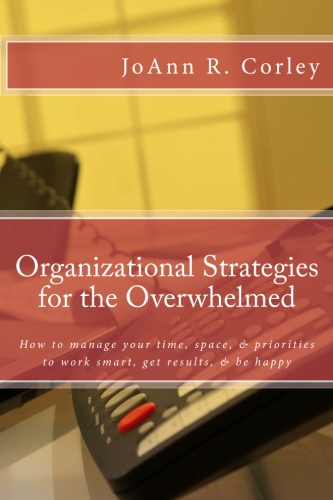
Productivity remains an idealistic view of how you want your work life to be if you aren't organized. JoAnn Corley authored Organizational Strategies for the Overwhelmed to help people learn and maintain the skills they need to get organized, which in turn helps to reduce stress. Corley tells us how solopreneurs and entrepreneurs can make use of these tips to become more productive.
1. What tips can you give to solopreneurs and entrepreneurs for organizing their busy schedules?
3 Key Tips: a. Be clear on the activities that have the highest impact on revenue b. Prioritize those activities daily c. Communicate that to everyone who influences your time -- communicate and enforce boundaries, which will help effectively manage interruptions d. Be very time aware by tracking your time usage = it's eye opening
2. How important is an organized workspace? How can people organize their space to maximize productivity?
An organized workspace is a time and stress management issue. A huge time waster is trying to find something. The more time it takes the more the level of frustration and stress is generated. An organized workspace provides an ease and flow to the execution of in office activities.
To organize a workspace consider these 2 tips: 1. Organize your space into [two] zones: A space = things you use everyday, B space = [things you] need within the course of a week, [and] C space = [things you use] within the cycle of a month. 2. Use the 3 "Cs" of finding and organizing things: Categorize, Colorize, Containerize
3. How do individual personalities impact productivity?
There are several aspects, but the most impactful is whether someone is a right or left brain [dominant]. Right brain folks are the natural multi-taskers because that part of the brain gets bored easily with task orientated work--it would much rather be with people or doing something more expressive. The left brain is the more naturally organized, it likes systems, order and control. The catch with the left brain is if there is too much going on at once it will become overwhelmed.
4. What are some ways people can manage interruptions and get rid of distractions?
The best way to manage an interruption is to set a clear boundary of how much time will be used to give attention to the need. So for example, I have just about 5 minutes right now, I'm all ears. That way, when about 5 minutes have occurred it makes it much easier to close the conversation. Distractions can be easily managed because it's usually a tangible item -- like turning off the email indicator. The key is acknowledging what they are, seeing that if they are managed it could make a big difference in overall productivity.
5. If you could give just one piece of advice to a disorganized person, what would it be?
Get help. Have someone organize your offline and online space, so they can start with a clean baseline. Get a coach to start developing the critical habits to getting the needed results







